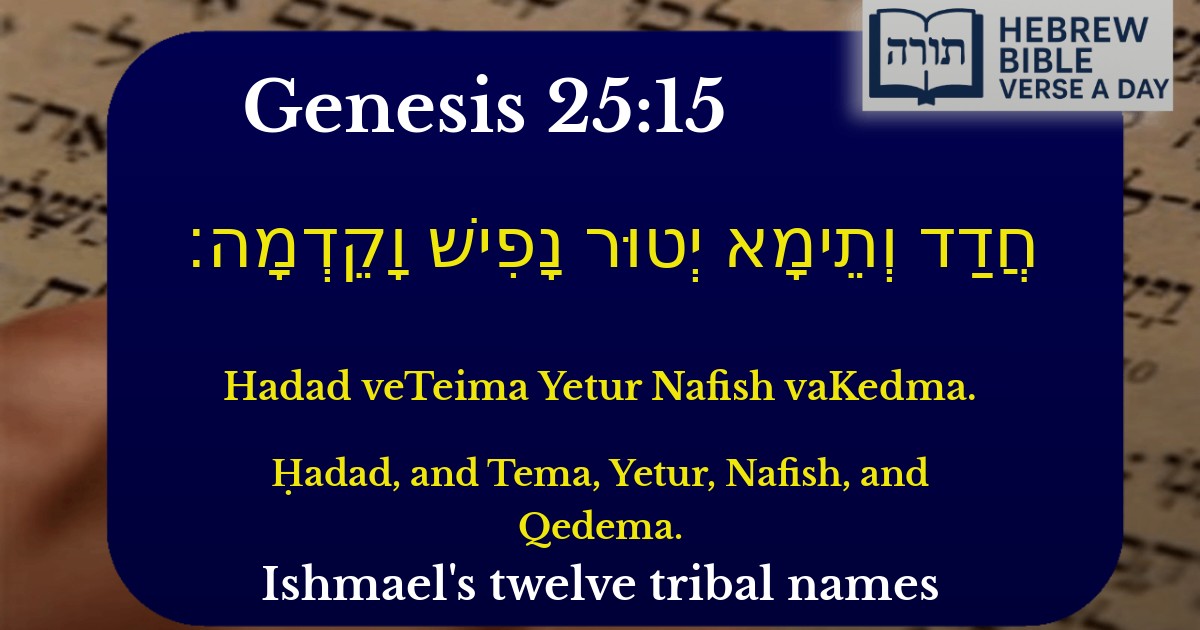Frequently Asked Questions
Q: Who are the people mentioned in Genesis 25:15?
A: Genesis 25:15 lists the names of the twelve sons of Yishmael (Ishmael), the son of Avraham and Hagar. These names represent the tribes that descended from Yishmael. According to Rashi, these tribes settled in the Arabian Peninsula and became prominent nations.
Q: Why does the Torah list the names of Yishmael's sons?
A: The Torah lists Yishmael's sons to show the fulfillment of Hashem's promise to Avraham that Yishmael would also become a great nation (Genesis 17:20). The Midrash explains that these tribes played significant roles in history, and their mention highlights Divine providence in shaping nations.
Q: What is the significance of the names in Genesis 25:15?
A: The names of Yishmael's sons reflect traits or events related to their lives. For example, 'Tema' (תֵימָא) is connected to the desert region in Arabia, and 'Yetur' (יְטוּר) may relate to dwelling or enclosure. Rashi notes that these names often correspond to the lands they inhabited.
Q: How does Genesis 25:15 connect to Jewish tradition?
A: This verse is part of the Torah's narrative about Avraham's descendants, emphasizing that both Yitzchak (Isaac) and Yishmael were blessed with many offspring. Jewish tradition teaches that while Yitzchak carried forward Avraham's spiritual legacy, Yishmael's descendants also had a role in history, as seen in later interactions with the Jewish people.
Q: Are the tribes of Yishmael mentioned elsewhere in the Torah?
A: Yes, some of these tribes appear later in Tanach. For example, the Midrash connects the descendants of Yetur (יְטוּר) to the Itureans mentioned in later Jewish history. The Talmud (Taanit 21a) also references interactions with these nations, showing their continued presence in the region.


Context in Genesis
The verse חֲדַד וְתֵימָא יְטוּר נָפִישׁ וָקֵדְמָה (Ḥadad, and Tema, Yetur, Nafish, and Qedema) appears in Bereishit (Genesis 25:15) as part of the list of the twelve sons of Yishmael. These names represent the tribes descended from Yishmael, fulfilling Hashem’s promise to Avraham that Yishmael would father twelve princes (Genesis 17:20).
Interpretation of the Names
Rashi, citing Bereishit Rabbah (62:4), explains that these names reflect the nature and dwelling places of Yishmael’s descendants:
Historical and Prophetic Significance
The Rambam (Hilchot Melachim 11:5) notes that the descendants of Yishmael play a role in the pre-Messianic era, as their dominance is a sign of the approaching redemption. The Midrash Tanchuma (Toldot 5) also alludes to the future interactions between Yishmael’s offspring and the Jewish people, emphasizing Divine providence in their rise and fall.
Geographical Connections
Many of these names correspond to known locations in the ancient Near East, as noted by Radak (Rabbi David Kimchi). For example, Tema is identified with the oasis of Tayma in northwestern Arabia, mentioned in Assyrian and Babylonian records. This reinforces the Torah’s historical accuracy regarding the spread of Yishmael’s descendants.